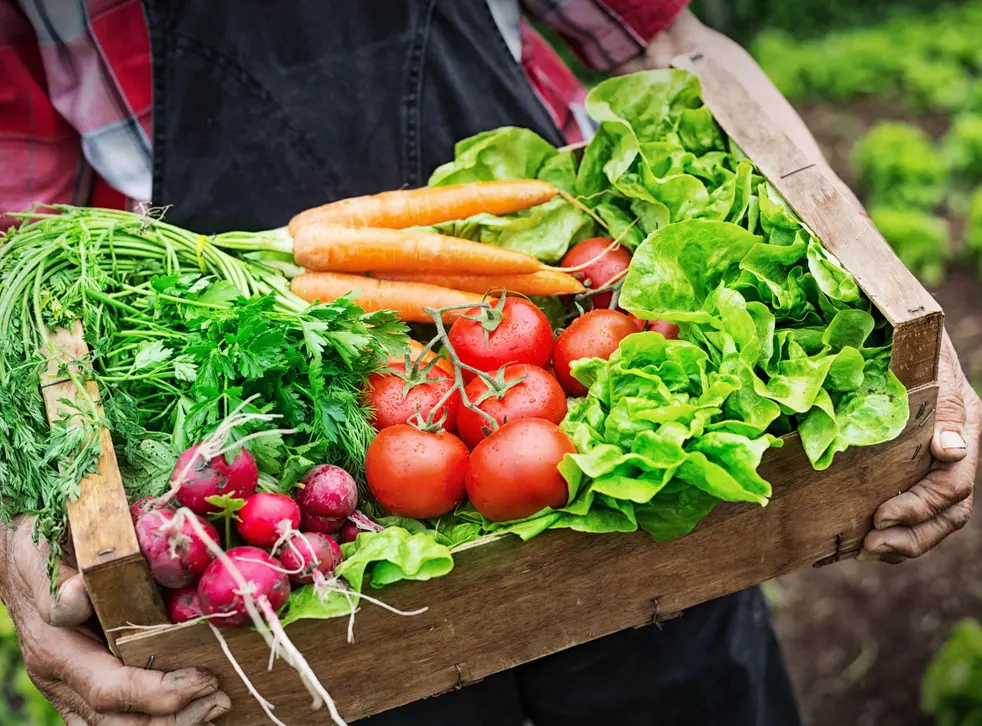Seasonal and Local eating is a dietary approach that involves consuming food grown and harvested in the same region and during the appropriate season. This practice emphasizes the consumption of fresh, minimally processed food that is in harmony with the local environment and its natural growing cycles.
The environmental benefits of local and seasonal eating include a reduction in the carbon footprint of food production, transportation, and storage as the food does not have to travel far to reach the consumer. In terms of health, seasonal and local food is often fresher and contains higher levels of nutrients, and is grown using sustainable farming practices, leading to healthier soil and higher-quality food.
Eating locally and seasonally also supports the local economy by promoting local farmers and food producers, helping to strengthen the local food system. It also fosters a sense of community by connecting people with the land and the food they eat.
Lastly, seasonal food is often picked at its peak of ripeness, resulting in more flavorful food. In conclusion, local and seasonal eating prioritizes health, sustainability, and community, while providing delicious, fresh food options.
Why Local Eating?

There are several compelling reasons to eat local food:
- Environmental Sustainability: Food that is grown locally and seasonally has a smaller carbon footprint compared to food that is grown far away and then transported to your area. By eating local food, you can reduce the amount of energy required for transportation, refrigeration and storage.
- Fresher and Nutritious: Local food is usually picked at the peak of ripeness, ensuring that it is fresh and nutritious. This is because the food doesn’t have to be stored for long periods or treated with preservatives to extend its shelf life.
- Supports Local Farmers and Economy: Eating local food helps support the local farming community and food producers, which can help to strengthen the local economy.
- Better for the Environment: By supporting local farmers, you can encourage them to use sustainable farming practices that are better for the environment and promote soil health.
- Unique and Flavorful: Local food is often grown using traditional varieties that are well-adapted to the local climate and soil, resulting in unique and flavorful food options.
- Promotes Food Diversity: Eating local food helps to promote food diversity, which is important for the health of both people and the environment.
- Builds Community: Eating local food can bring people together, build relationships and foster a sense of community. By connecting people with the food they eat, it helps to create a more sustainable and resilient food system.
In summary, eating local food offers numerous benefits for the environment, health, local economy, and community, and provides a delicious and diverse range of food options.
How is Consuming Exotic Food Harmful?
Exotic food, or food that is grown and harvested in a different region or country, can have several negative impacts on both the environment and local communities:
- Environmental Impacts: The transportation of exotic food over long distances contributes to greenhouse gas emissions and air pollution. Additionally, the production of exotic food in other regions can lead to deforestation, soil degradation, and water depletion.
- Biodiversity Loss: The cultivation of exotic food can lead to the displacement of native plants and animals, reducing biodiversity and disrupting ecosystems.
- Cultural Appropriation: Exotic foods are often associated with cultural appropriation, which can erase the cultural heritage and traditions of local communities.
- Negative Economic Impacts: The import of exotic food can negatively impact local farmers and food producers by driving down prices and reducing demand for locally grown food.
- Health Concerns: Exotic food is often produced using monoculture farming practices, which can lead to soil degradation, use of synthetic fertilizers and pesticides, and the spread of plant diseases. This can result in food that is lower in quality and potentially harmful to human health.
- Food Insecurity: In regions where exotic food is imported, local food production can decrease, leading to food insecurity and dependence on imported food.
In conclusion, exotic food can have negative impacts on the environment, local communities, and human health, and it is important to consider these impacts when making food choices. By prioritizing local and seasonal food, we can help to reduce these negative impacts and support a more sustainable and resilient food system.

Why is Local Eating better than Exotic Food?
Some general trends suggesting the benefits of local eating over exotic food are:
- Lower Carbon Footprint: Local food typically has a lower carbon footprint compared to exotic food, as it does not have to be transported over long distances. According to a study by the Leopold Center for Sustainable Agriculture, the average distance food travels from farm to plate in the U.S. is around 1500 miles.
- More Nutritious: Local food is often picked at the peak of ripeness, which can result in food that is more nutritious compared to food that is picked before it is fully ripe and then transported over long distances.
- Supports Local Economy: By supporting local farmers and food producers, eating local food can help to strengthen the local economy and reduce dependence on imported food.
- Promotes Food Diversity: Eating local food can help to promote food diversity and prevent the loss of traditional food varieties.
- Better for the Environment: By supporting local farmers, you can encourage them to use sustainable farming practices that are better for the environment and promote soil health.
These are just a few examples of the benefits of local eating, and more research is needed to fully understand the complex interplay between local food systems and the environment, economy, and human health.
Statistics : Benefits of Seasonal and Local Eating
Some statistics related to specific benefits of seasonal and local eating are:
- Environmental Benefits: A study by the Leopold Center for Sustainable Agriculture found that the average distance food travels from farm to plate in the U.S. is around 1500 miles. By consuming local and seasonal food, we can reduce the carbon footprint of food production, transportation, and storage.
- Health Benefits: A study published in the Journal of the Academy of Nutrition and Dietetics found that seasonal produce contains higher levels of antioxidants compared to non-seasonal produce. Another study found that local food is often fresher and contains higher levels of nutrients compared to food that is transported over long distances.
- Economic Benefits: According to the USDA, farmers markets in the U.S. have increased by 180% since 1994. By supporting local farmers and food producers, we can help to create a more resilient local food system and strengthen the local economy.
- Community Benefits: Local food can bring communities together and help to build a sense of place and identity. A study published in the Journal of Agriculture, Food Systems, and Community Development found that farmers markets play a significant role in building social capital and promoting community development.

These are just a few examples of the benefits of seasonal and local eating. While more research is needed to fully understand the complex interplay between local food systems and the environment, economy, and human health, these statistics provide some insight into the positive impact that seasonal and local eating can have.
How does Local Eating Benefit Health?
Local eating has been associated with several health benefits that can help prolong life and prevent diseases:
- Fresher and more nutritious food: Local food is often fresher and contains higher levels of nutrients compared to food that is transported over long distances. This can help to improve overall health and prevent nutrient deficiencies.
- Reduction of exposure to pesticides and chemicals: By consuming food grown using sustainable and organic farming practices, people can reduce their exposure to harmful chemicals and pesticides, which can have negative health effects.
- Increased consumption of fruits and vegetables: Consuming seasonal and local food often involves an increased consumption of fresh fruits and vegetables, which are an important source of vitamins, minerals, and fiber. These nutrients can help to reduce the risk of chronic diseases such as heart disease, cancer, and type 2 diabetes.
- Promotion of healthy cooking and eating habits: By cooking with seasonal and local ingredients, people can develop healthy cooking and eating habits that support a balanced diet and good health.
- Reduced food waste: By consuming food that is in season, people can reduce food waste by only buying what is needed for a particular meal or recipe, rather than buying large quantities of food that will eventually spoil.
Overall, local eating can have a positive impact on health by promoting fresh and nutritious food, reducing exposure to harmful chemicals, and encouraging healthy cooking and eating habits. While more research is needed to fully understand the relationship between local eating and health, the available evidence suggests that this approach to eating can help to prolong life and prevent diseases.

Conclusion
In conclusion, local and seasonal eating is a way of consuming food that is grown and harvested in the same region and during the appropriate season. This approach to eating has several benefits, including environmental, health, economic, community, and flavor.
From an environmental perspective, local and seasonal eating can reduce the carbon footprint of food production, transportation, and storage. Health benefits include the consumption of fresher and more nutritious food, reduced exposure to pesticides and chemicals, increased consumption of fruits and vegetables, promotion of healthy cooking and eating habits, and reduced food waste.
From an economic perspective, supporting local farmers and food producers can help to strengthen the local economy and create a more resilient food system. From a community perspective, local and seasonal eating can help to build a sense of community by connecting people with the land and the food they eat.
Finally, local and seasonal eating can have a positive impact on health by promoting fresh and nutritious food, reducing exposure to harmful chemicals, and encouraging healthy cooking and eating habits. While more research is needed to fully understand the relationship between local eating and health, the available evidence suggests that this approach to eating can help to prolong life and prevent diseases.
Overall, local and seasonal eating is a way to prioritize health, sustainability, and community while enjoying delicious, fresh food.

